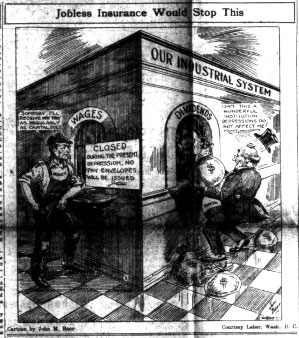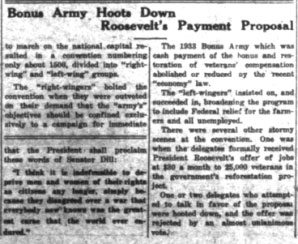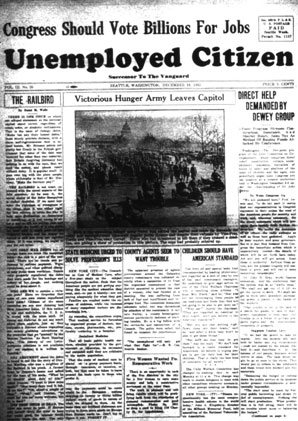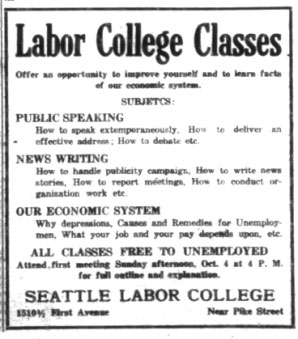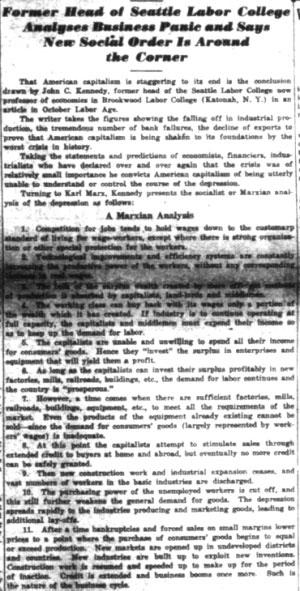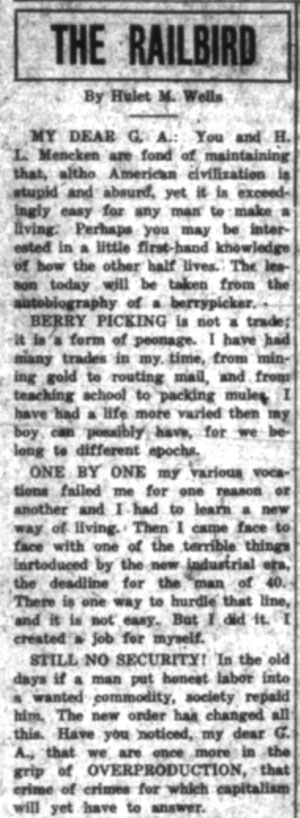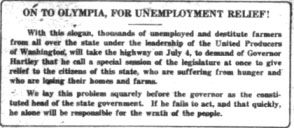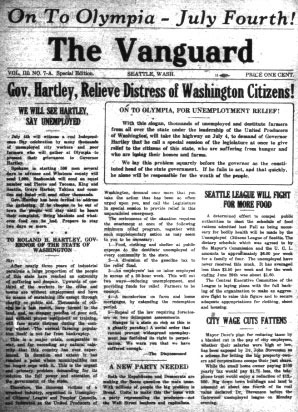Vanguard & Unemployed Citizen
|
Abstract: Published by the left-wing Seattle Labor College, The Vanguard became the voice of Seattle's army of unemployed during the early 1930s. It helped launch the Unemployed Citizens League in 1931 and gained considerable influence as thousands joined the UCL's self-help projects and joined in the organization's demands for funds and services for the unemployed. The weekly changed its name to the Unemployed Citizen in 1933. Circulation: One year for sixty cents, six months for thirty cents and two subscriptions for one year to different addresses for one dollar Publishers: Seattle Labor College, Unemployed Citizens League Editors: Carl Brannin, Hulet Wells Political Affiliation: Conference for Progressive Labor Action Collection: University of Washington Mircofilm A4817 From 1930 to 1933 the Seattle Labor College published The Vanguard. During this time The Vanguard achieved a large circulation. The paper’s close relationship with the Seattle Labor College and the Unemployed Citizens League gave the paper a great deal of political influence. The Vanguard became a strong voice for unemployed workers. The paper was a great platform for the Seattle Labor College and the Unemployed Citizen League (UCL) to introduce workers to, at the time, radical concepts in economics and politics. The editor of the paper was Carl Brannin. The Vanguard was based in Seattle and sold most of its papers there, but also attracted readers in other parts of the state The subscription rate for the paper, which was listed on the top left hand corner of page four on most papers was at sixty cents for one year, thirty cents for six months and one dollar for two subscriptions for one year to different address. The bundle rate, for papers sold in bulk by unemployed vendors or participating organizations, was three cents per copy. Carl Brannin was the founder of The Vanguard. Carl Brannin was born on September 22, 1888 and grew up with four brothers and two sisters in Cisco, Texas. In 1919, Brannin organized of the Plumb Plan League in 1919 whose purpose was to promote public ownership of railroads. The League sent Carl and his wife Laura Haeckl to Seattle since it was one of the most progressive places in the country. In January 1930, he also founded and edited The Vanguard. The following year Brannin was instrumental in helping to establish a Washington chapter of the American Civil Liberties Union and was also active in the Seattle chapter of the Friends of the Soviet Union. A turning point in Brannin’s life was the development of a friendship with Hulet Wells of the Unemployed Citizens' League of Seattle. The league was formed on the basis of self-help among the unemployed and encouraged political representation of the unemployed in city and county governments. Brannin resigned as executive secretary of The Vanguard in July 1932, which was then published weekly. A letter appearing in the paper on March 17, 1933 told the readers that Brannin would be returning to Texas due to family and financial concerns. Brannin’s letter was one of regret but with some sense of accomplishment for being part of the Seattle movement. Seattle Labor College The Vanguard was published monthly by the Seattle Labor College to reach a large audience with its program of workers’ education. The paper’s proclaimed mission was to present a radical yet realistic approach to issues of the day relating to workers and the economy. The editors were socialists, although not closely tied to the Socialist party. For a time, the paper was affiliated with the Conference for Progressive Labor Action (CPLA) founded by A.J. Muste of Brookwood Labor college in Pennsylvania. The Vanguard proclaimed and tried to implement the objectives of the Seattle Labor College:
Unemployed Citizen’s League Founded in 1931 by former labor activists and left-wing radicals, and composed of neighborhood branches the UCL addressed the needs of the unemployed in their respective communities. The league was founded to foster self-help among the unemployed and to encourage political representation of the unemployed in city and county governments. With the policy of no dues and no paid officers, it was an organization of workers without work. They had weekly meetings and drafted a constitution establishing their objectives: employment, self-help, insurance, and relief in the form of asked for city and county financing. The movement quickly gained national attention as one of the most active organization of unemployed citizens in the nation. It created a cooperative barter economy based on self-help that succeeded in developing a group consciousness and established the confidence to organize and survive in times of desperation. The league became so powerful that it helped elect a U.S. Senator, a U.S. Congressman, several members of the state legislature, and one city council member. But political dissension soon led to rivalry between the Communists and the Socialists in the league. News Topics The Vanguard covered a large array of topics in its issues. The paper’s main focuses were labor conditions and relations. It was also a platform for announcing meetings of the UCL, Seattle Labor College, and the local Socialist Party. The paper covered local, regional and national stories related to labor. The international coverage of the paper was mostly geared toward Russian news. While addressing the eight objectives of the labor college the paper set out to cover other important aspects of people’s lives. Child welfare was an important issue for the paper and the UCL. Its mission was to see that children were provided with the proper kind and amount of food in school lunches, as well as proper nursing and care. Articles on what appeared to be everyday life were written in most issues. Worker Education The Vanguard appeared to have strong and effective tactics to educate the unemployed in the city of Seattle on a wide range of topics. In the September 1931 issue the Seattle Labor College announced that its regular 7:30 pm Sunday meetings in October would feature different classes and economic lectures. The Labor College offered classes on public speaking, news writing and publicity methods, and understanding economic systems. The public speaking class covered things such as, how to speak extemporaneously, how to deliver an effective address, how to debate, and how to conduct a meeting. The news writing class and publicity methods class included: how to report, how to write news notices, how to write feature stories, and how to conduct organization work. The most interesting appeared to be the classes on economics. The classes’ main objective seems to be to give a clear, although clearly biased, understanding of the US economic system pointing out defects and remedies. Like the Seattle Labor College, the Vanguard also tried to be an educational vehicle. There were lectures and article nearly every month addressing the issue of economics, which was mostly gear toward informing the reader in detail on why certain aspects of the US economic had failed. A diagram by Colston Estry Warne along with an article entitled "Facts Stand out as Banks Close," in the March 17, 1933 issue gave a step-by-step reasoning of why so many banks had failed. The article even makes mention of the Postal Savings System. Recognition of the Soviet Russia Recognition of Soviet Russia by the United States was another issue that The Vanguard stressed. The Vanguard believed that the Russian Revolution was the wave of the future. In the June 1931 issue of The Vanguard advertised a Tacoma worker by the name of Alex Noral coming to speak about his two year working experience on a collective grain farm. Noral would also speak about the five-year plan, collectivization of agriculture and Soviet life. The Seattle Labor Council invited many speakers to talk about the great time they had in Russia. The June 1931 issue had an article titled "U.S Workers Crowd Soviet After Jobs," which describes how the Russian Government felt that the skilled workers would have no problem finding a job but the unskilled workers my be disappointed. Although all of the U.S immigrants paid for all their expenses to get to Russia the article gave the impression that the Russian government was still be over whelmed be the number of American looking for work. The paper used this demonstrated the high number of Americans wanting to move to Russia for work. The Vanguard clearly took a socialist party bias on most of the issues it presented in the paper.
The newspaper had a good number of advertisements. The majority of them were for local grocery stores. Political candidates also placed ads in the paper. The writer Upton Sinclair was another advertiser. The Vanguard featured excerpts of his latest books and pamphlets and instructed the reader to send fifteen cents to receive a copy of the whole pamphlet.
|
Click to enlarge
The Depression The paper featured scores of articles commenting on the causes and cures for the Great Depression, focusing on national groups, like the Bonus Marchers, that sought assistance from the government.
The Labor College The Seattle Labor College, the organization which published the papers, offered classes for workers on subjects ranging from Marxist theory to publish speaking and union organizing.
The Railbird Each issue featured an editorial, usually on page one, written by "The Railbird." The name alluded to the fact that the depression forced many men in the 30s to stow away on freight trains and criss-cross the country in search of work.
The March on Olympia In the 1930s, unemployed workers in Washington state organized a march on Olympia in order to demand relief assistance from the state government. The paper covered the march in a special edition.
|

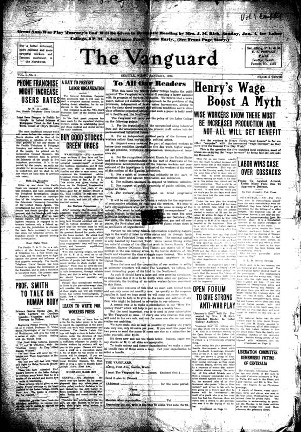
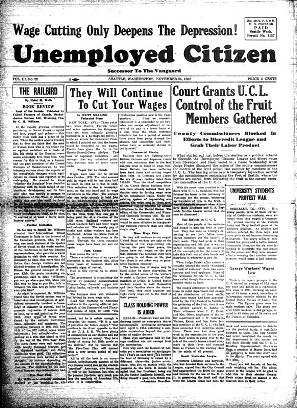
--Nov.%201931--p.1.jpg)

